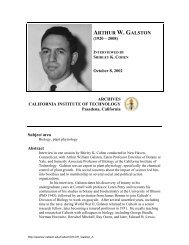Interview with Thomas A. Tombrello - Caltech Oral Histories
Interview with Thomas A. Tombrello - Caltech Oral Histories
Interview with Thomas A. Tombrello - Caltech Oral Histories
Create successful ePaper yourself
Turn your PDF publications into a flip-book with our unique Google optimized e-Paper software.
<strong>Tombrello</strong>–8<br />
radio.” And she walks over and turns it up, and we heard the announcement of the attack on<br />
Pearl Harbor.<br />
My mother was particularly concerned, because my father’s youngest brother, Dominic—<br />
Uncle D. to me—who was in the peacetime navy, had been at Pearl the last we’d heard. He was<br />
a chief petty officer on the cruiser Pensacola. So my mother and father were extremely worried.<br />
It was only later that we discovered something that was a surprise to everybody, particularly<br />
[Japanese Naval Marshal General Isoroku] Yamamoto. Shortly before December 7th, the<br />
carriers had gone off on a cruise, accompanied by the cruisers. They weren’t there, and all that<br />
was left in Pearl were the battleships. This was quite a disappointment to Yamamoto. He kept<br />
saying, “But what about the carriers?” The answer was, nobody knew about the carriers. They<br />
weren’t there. And my uncle wasn’t there.<br />
And so that was a day I truly remember. First, it had been a lovely day. It ended, then,<br />
on this note of apprehension. My mother said to the young men who were gathered there, “I<br />
think this may be the last time we are all together for such a holiday.” And it was true. They<br />
were all drafted. They were all sent off various places to do all kinds of things: some into active<br />
war-torn zones; some, because they had been in the merchandising business, to the<br />
Quartermaster Corps, where they made sure things ran smoothly in moving materiel around the<br />
world. But it was indeed entirely predictable that these people did disappear very soon into<br />
World War II.<br />
So that fall I started school. I didn’t like school very much—I was like some long-term<br />
inmate of a penitentiary. I tried to do easy time—don’t volunteer for anything; take a book to<br />
school every day from the public library. Try to read it, and not get caught, and you learn a great<br />
deal if you read a book a day for a long time. So that was my view of the public schools. This<br />
was incarceration. I had to do it, and I had to make reasonable grades, but I didn’t enjoy it much.<br />
I enjoyed playing <strong>with</strong> my friends. We fought the battles of World War II, and we fought the<br />
battles for the American West, the cowboys-and-Indians thing across the backyards of our part of<br />
Memphis.<br />
For me the war did not bring hardships. I’m sure it was difficult for my parents. There<br />
was rationing. Tires wore out. A car trip was an adventure, because I thought that every trip had<br />
at least one or two flat tires. It was always true for us. We went down to Pensacola, Florida,<br />
once, right at the beginning of the war. It must have been the summer before first grade. But<br />
http://resolver.caltech.edu/<strong>Caltech</strong>OH:OH_<strong>Tombrello</strong>_T

















